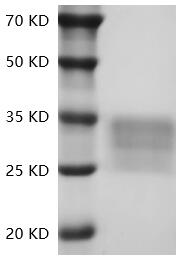| Product name | Human CD7/GP40 protein, His tag (Animal-Free) |
| Sequence | Amino acid sequence derived from human CD7 protein (NP_006128.1,Met 1-Pro 180) was expressed with a polyhistidine tag at the C-terminus. |
| Protein length | The recombinant human CD7/GP40 protein consists of 161 amino acids and predicts a molecular mass of 18 kD.The apparent molecular mass of the human CD7 is approximately 25-35 kDa in SDS-PAGE under reducing conditions due to glycosylation. |
| Preparation method | HEK293 Cells |
| Purity | >95% as determined by SDS-PAGE |
| Alternative | CD7 Molecule;T-Cell Leukemia Antigen;T-Cell Antigen CD7;TP41;T-Cell Surface Antigen Leu-9;CD7 Antigen (P41);P41 Protein;LEU-9;Tp40;CD7 Antigen 4;CD7 |
| Formulation | 0.22 µm filtered protein solution is in PBS, pH 7.4. |
| Features & Benefits | Endotoxin: <0.1 EU per μg of the protein as determined by the LAL method. |
| Molecular weight | 18 kDa |
| Usage notes | Always centrifuge tubes before opening. It is recommended to reconstitute the lyophilized human CD7/GP40 protein using the buffer we provided not less than 100 µg/mL, which can then be further diluted to other aqueous solutions. |
| Storage instructions | Lyophilized Human CD7/GP40 protein, His tag (Animal-Free)should be stored desiccated below -20°C. Upon reconstitution, the protein should be stored at 4°C between 2-7 days and for future use below -20°C. For long term storage it is recommended to add a carrier protein (0.112% HSA or BSA). Please prevent freeze-thaw cycles. |
| Shipping | The product is shipped at ambient temperature. |
| Precautions | The product listed herein is for research use only and is not intended for use in human or clinical diagnosis. Suggested applications of our products are not recommendations to use our products in violation of any patent or as a license. We cannot be responsible for patent infringements or other violations that may occur with the use of this product. |
| Background | The CD7 antigen is a member of the immunoglobulin superfamily that expresses on the surface of all thymocytes, a majority of mature T cells, and also natural killer cells. Interestingly, under physiological and different pathological conditions, the loss of CD7 antigen occurred in the subset of CD4+ memory T cells. The functions of the cell membrane CD7 antigen have been investigated in human mature T and NK cells, showing the direct involvement of this molecule in multiple effector functions related with activation, proliferation, production of cytokines and modification of adhesion properties. The CD7 glycoprotein is not only expressed by mature lymphoid cells, but also by early hematopoietic progenitors and several types of leukemias, suggesting a role of CD7 during hematopoiesis. |
| Gene ID | 924 |
| Alternative | CD7 Molecule;T-Cell Leukemia Antigen;T-Cell Antigen CD7;TP41;T-Cell Surface Antigen Leu-9;CD7 Antigen (P41);P41 Protein;LEU-9;Tp40;CD7 Antigen 4;CD7 |
| Accession | P09564 |

Fig.SDS-PAGE analysis of Human CD7/GP40 protein
You must be logged in to post a review.
1.The species of antibody reactivity should be the sample species that can be matched normally after Abbkine R&D experts have passed strict scientific verification. If your sample is not within the range of reactivity, in order to improve the efficiency and results of your experiment, it is not suggested to try other species. Otherwise, it may lead to sample mismatch and affect the effect of your experiment.
2.Please aliquot the antibody received as soon as possible and store it at -20℃, avoid repeated freezing and thawing, and use it within one year.
Welcome any form of communications, and better service will be provided here.
Tell: +1-404-854-0155
Email: service@abbkine.com
Support Email: support@abbkine.com
Address: 3052 Stroop Hill Road, Apt 203, Atlanta 30303, Georgia, United States of America




Reviews
There are no reviews yet.